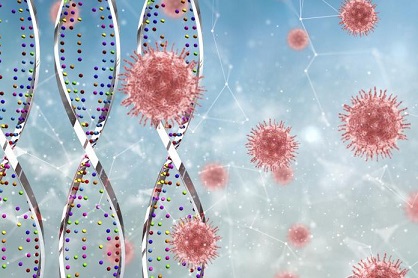Genetic Variants And COVID-19 - The Association Of CRP Gene rs1205 With Disease Severity
Nikhil Prasad Fact checked by:Thailand Medical News Team Apr 28, 2024 11 months, 3 weeks, 6 days, 6 hours, 26 minutes ago
COVID-19 Genetics: The global COVID-19 pandemic has brought to light various aspects of disease susceptibility and severity, including the potential role of genetic variations in influencing outcomes. One such genetic variant that has recently garnered attention is rs1205, located in the C-reactive protein (CRP) gene. A collaborative study that is covered in this
COVID-19 Genetics news report involving researchers from multiple institutions in the United States delved into the association between rs1205 and COVID-19 outcomes, particularly focusing on hospitalization and mortality rates among American Indian populations.
 Genetic Variants And COVID-19 - The Association Of CRP
Genetic Variants And COVID-19 - The Association Of CRP
Gene rs1205 With Disease Severity
Background and Context
COVID-19 has disproportionately affected certain ethnic and racial groups, with American Indian and Alaska Native (AI/AN) communities experiencing higher hospitalization and death rates compared to other demographics. While factors such as age, comorbidities, and socioeconomic status contribute to these disparities, the potential role of genetic predispositions has gained traction in recent research.
Study Design and Objectives
The study utilized data from the Strong Heart and Strong Heart Family studies, which have been ongoing for several decades, collecting genetic and cardiovascular information from AI/AN communities. The primary objective was to investigate the association between rs1205 and COVID-19 severity, accounting for various confounding factors such as age, sex, body mass index (BMI), and cardiovascular disease history.
Genetic Variants and COVID-19
A literature review informed the selection of candidate genetic variants implicated in COVID-19 pathogenesis or clinical outcomes. These included genes related to the interferon response pathway, APOE, TMPRSS2, TLR3, ACE, FURIN, HLA regions, and ABO blood group polymorphisms. Among these variants, rs1205 in the CRP gene emerged as a significant candidate.
Results and Analysis
The study identified a statistically significant association between the rs1205 T-dominant genotype and increased risk of COVID-19 hospitalization or death among American Indian participants. This association remained significant even after adjusting for known clinical risk factors and relatedness within the study cohort. Notably, individuals with the rs1205 T-dominant genotype exhibited lower levels of CRP, a marker of inflammation, potentially influencing disease progression.
The findings revealed a statistically significant correlation, indicating that individuals with the rs1205 T-dominant genotype faced an increased risk of severe COVID-19 outcomes.
-Statistical Significance: Through rigorous statistical analyses, including chi-square tests, logistic regression models, and adjustment for confounding variables, the study established the robustness of the association between rs1205 genotype and COVID-19 seve
rity. Even after accounting for known clinical risk factors such as age, sex, BMI, and prior history of cardiovascular disease, the association remained statistically significant. This underscores the independent contribution of the rs1205 genetic variant to the observed outcomes.
-Lower Levels of CRP: One intriguing aspect of the study's findings was the observation that individuals with the rs1205 T-dominant genotype exhibited lower levels of C-reactive protein (CRP), a well-known marker of inflammation. This finding is particularly noteworthy as elevated CRP levels are often associated with severe inflammatory responses, including those seen in COVID-19 patients with critical illness.
-Potential Influence on Disease Progression: The link between rs1205 genotype, lower CRP levels, and increased risk of COVID-19 hospitalization or death raises intriguing questions about the underlying mechanisms. While CRP is traditionally considered a biomarker for inflammatory response, its role as a potential modifier of infection response has been documented in various contexts, including vaccination outcomes and other infectious diseases.
The observed lower CRP levels in individuals with the rs1205 T-dominant genotype may indicate a different immune response profile, potentially impacting disease progression. It is plausible that a relative deficiency in CRP or altered immune signaling associated with this genetic variant could contribute to a dysregulated immune response during COVID-19 infection, leading to increased morbidity and mortality.
Implications and Future Research
These findings have significant implications for understanding the genetic determinants of COVID-19 severity and tailoring interventions accordingly. Further research is warranted to elucidate the precise mechanisms through which the rs1205 genotype influences immune response and disease outcomes.
Future studies should also explore the broader landscape of genetic variants implicated in COVID-19 severity, considering diverse populations and incorporating comprehensive genetic analyses. By unraveling the complex interplay between genetics, immune function, and disease progression, researchers can pave the way for targeted therapies and personalized approaches to managing COVID-19 and related infections.
The findings shed light on the complex interplay between genetic factors and COVID-19 outcomes, particularly highlighting the role of innate immune system components like CRP. The study's strengths lie in its robust methodology, including physician-reviewed medical records and comprehensive genetic analysis.
Limitations and Future Directions
Despite the study's significant findings, limitations such as the relatively small number of cases and potential population stratification warrant further investigation. Future research should aim to replicate these findings in diverse populations and explore additional genetic variants that may contribute to COVID-19 severity.
Conclusion
In conclusion, the study provides compelling evidence of the association between the rs1205 genetic variant in the CRP gene and COVID-19 outcomes among American Indian populations. This underscores the importance of considering genetic factors in understanding disease susceptibility and severity, offering potential avenues for therapeutic interventions and preventive strategies. As the pandemic continues to evolve, ongoing research efforts will be crucial in unraveling the intricate mechanisms underlying COVID-19 pathogenesis.
The study findings were published in the peer reviewed journal: PLOS One.
https://journals.plos.org/plosone/article?id=10.1371/journal.pone.0302464
For the latest on
COVID-19 Genetics, keep on logging to Thailand Medical News.
See Also:
https://www.thailandmedical.news/articles/covid-19-genetics
